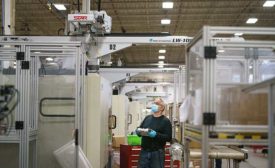Articles by Harry Moser
Making it in America—Companies Reshore Manufacturing of Essential Products
Shortages of essential products caused or revealed by the COVID-19 pandemic warrant shortening supply chains to reduce risk and increase resilience.
August 2, 2021
How Automation Accelerates Reshoring—Part 2
February 9, 2021
Get our new eMagazine delivered to your inbox every month.
Stay in the know on the latest assembly trends.
SUBSCRIBE TODAY!Copyright ©2024. All Rights Reserved BNP Media.
Design, CMS, Hosting & Web Development :: ePublishing








